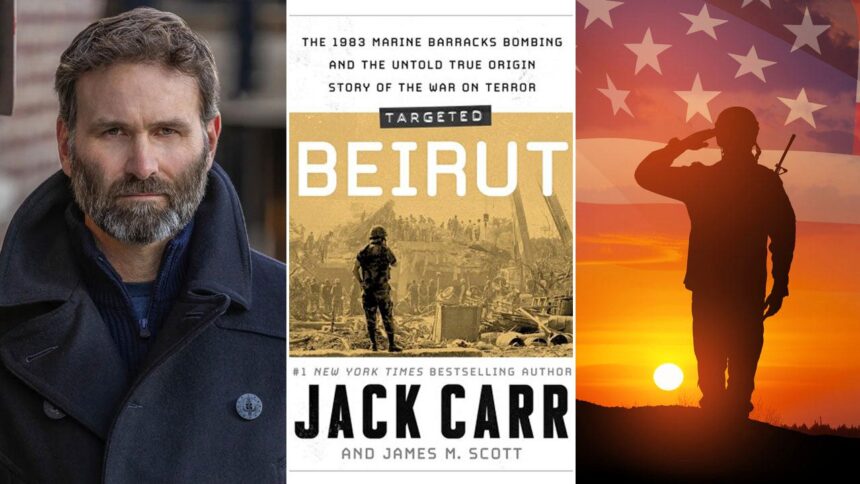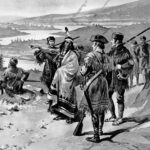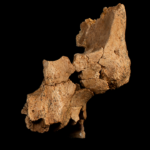FIRST ON FOX: Editors’ notice: New York Occasions bestselling writer and former U.S. Navy SEAL sniper Jack Carr has teamed up with Pulitzer Prize finalist James M. Scott for a collection of nonfiction books that discover key terrorist occasions all over the world that modified the course of historical past.
The primary guide within the collection, “Focused: The 1983 Beirut Barracks Bombing,” is revealed this week, on Sept. 24, 2024, by Atria Books/Emily Bestler Books, a division of Simon & Schuster — and readers of Fox Information can catch an unique preview forward of the official launch.
“Those that have learn my James Reece ‘Terminal Record’ collection or who observe me on social media know the significance I place on historical past, notably the historical past of warfare, terrorism, insurgencies, counterinsurgencies and particular operations,” Carr beforehand advised Fox Information Digital in an interview.
JACK CARR, BESTSELLING AUTHOR AND FORMER SEAL, ANNOUNCES NONFICTION SERIES, ‘TARGETED,’ ON TERROR EVENTS
The phobia assault on the Marine Corps barracks in Beirut in Oct. 1983 killed 241 U.S. army personnel, together with 220 Marines, 18 sailors and three troopers. One other suicide bombing simply moments afterward killed 58 French paratroopers; six harmless Lebanese civilians had been additionally killed.
By particular association, right here is an unique excerpt from the brand new guide in regards to the devastating assault — 41 years in the past this fall — by Jack Carr and James M. Scott. It is already been deemed “required studying.”
The primary gentle of daybreak stretched throughout the Beirut sky at 5:24 a.m. that Sunday, Oct. 23, 1983.
Colonel Geraghty climbed out of his bunk a couple of minutes later, pulled on his uniform and boots, and washed his face with chilly water.
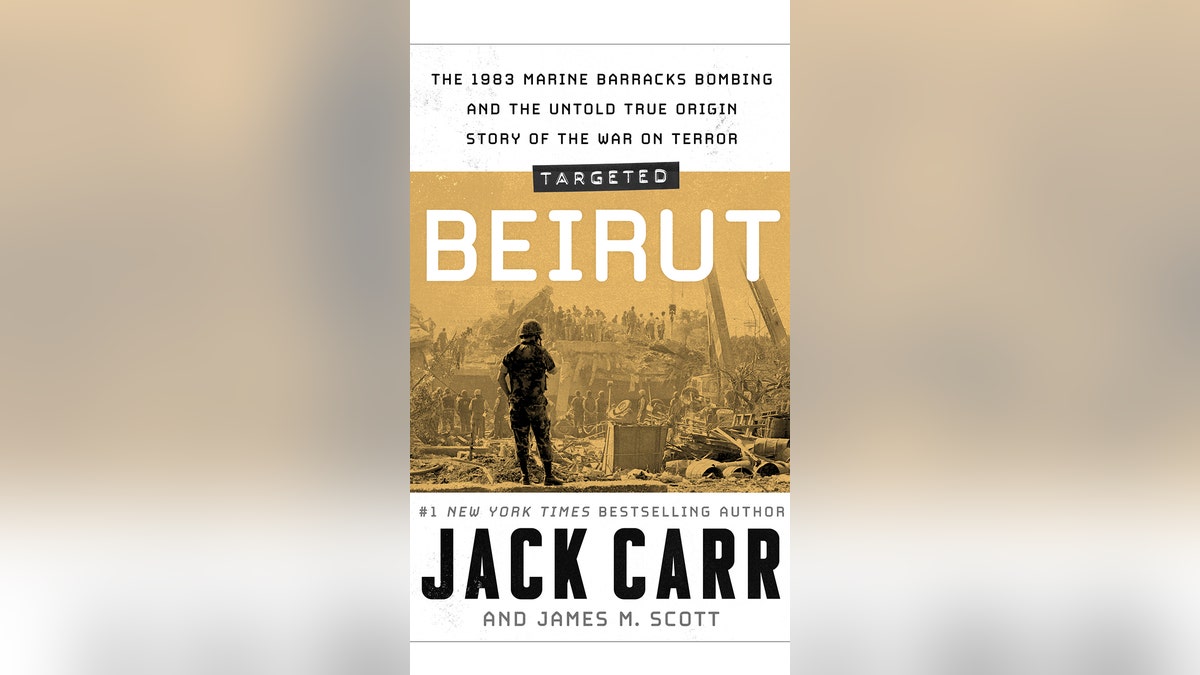
Jack Carr’s latest guide, co-authored with James M. Scott, is “Focused: The 1983 Beirut Barracks Bombing and the Untold True Origin Story of the Struggle on Terror,” from which this unique excerpt is drawn. The guide is revealed on Sept. 24, 2024. (Jack Carr/Simon & Schuster )
The Marine commander lived on the second deck of what had as soon as been the airport’s firefighting college, a two-story concrete construction within the shadow of the a lot bigger constructing that now housed the Battalion Touchdown Staff headquarters.
Geraghty walked downstairs to the Command Operations Middle, the place he checked in with the watch officer and thumbed by way of the most recent communications.
“Saturday evening,” he recalled, “had been, by Lebanese requirements, comparatively quiet.”
The colonel stepped exterior, the place the morning temperature hovered round seventy-seven levels. A couple of Marines returned from patrol whereas a handful of others ready for bodily coaching. It was nearly tranquil. Reveille, which usually blared at 5:30 a.m., would sound at 6:30 a.m., giving troops an additional hour of shut-eye.
The primary gentle of daybreak stretched throughout the Beirut sky at 5:24 a.m. that Sunday, Oct. 23, 1983.
“Sunday is my favourite day,” Hudson as soon as declared, “as a result of I get to sleep as late as I would like.” Brunch would observe from 8 a.m. till 10 a.m., a deal with that included omelets.
The Navy Broadcasting Service deliberate a 1:55 p.m. exhibiting of the Los Angeles Raiders versus the Washington Redskins — a sport that had performed stay twenty-one days earlier — adopted that night by the 1960 Western “The Magnificent Seven,” starring Yul Brenner and Steven McQueen.
“Sunday was usually the day individuals might anticipate studying a guide, writing a letter, or passing a soccer round,” remembered Employees Sergeant Randy Gaddo. “Later within the afternoon, everybody would usually get pleasure from a cookout, that includes hamburgers and scorching canine with all of the trimmings.”
Gaddo was one of many few up early. Regardless that it was Sunday, the “Root Scoop” editor had eight rolls of movie he wished to develop in his picture lab up on the third flooring of the Battalion Touchdown Staff headquarters.

The brand new nonfiction guide by No. 1 bestselling writer Jack Carr, pictured right here, is predicated on complete interviews with survivors and in depth army information, in addition to private letters, diaries and images. The guide is the authoritative account of the lethal assault that occurred in Oct. 1983. (Jack Carr/Simon & Schuster)
The earlier eight-page newspaper, which had landed among the many troops simply three days earlier, featured a roundup of the escalating sniper assaults towards American forces, together with the latest killing of Soifert and Ohler and the wounding of eight others.
Within the weekly “Chaplain’s Nook” column, Father George Pucciarelli drew from the Outdated Testomony guide of Ecclesiastes to supply consolation for the Marines in these harmful instances.
“Life is pricey,” the priest reminded readers, “however everlasting life is dearer.”
Gaddo left his tent for the headquarters constructing, a route he had achieved so many instances that he knew it took him simply fifty-one seconds. Like Geraghty, he famous the quiet; absent was the traditional soundtrack of artillery and gunfire.
On the final second, Gaddo determined to decelerate. It was, in spite of everything, Sunday morning. Why rush?
JACK CARR’S TAKE ON THE 1983 BEIRUT MARINE BARRACKS TERROR ATTACK: ‘OPENING SALVO IN A NEW WAR’
Apart from, he might use a cup of espresso. He diverted to the Fight Operations Middle, the place he poured a mug of darkish brew, sweetening it with a few scoops of sugar. Espresso in hand, he returned to his tent, the place he sat at his small area desk and commenced to jot down notes.
“The birds had been singing louder than I’ve ever heard birds sing,” Gaddo recalled. “It was like a symphony.”
Lance Corporal Burnham Matthews had simply returned from an all-night safety patrol across the south facet of the airport, the place the Marines had fanned out alongside the perimeter to intercept anybody who may infiltrate the compound.
“The birds had been singing louder than I’ve ever heard birds sing. It was like a symphony.”
The towering Texan climbed three flights of stairs and turned left towards the third-floor room he shared with 5 different Marines on the constructing’s north facet, anxious to break down on his cot.
As soon as inside, Corporal Kenny Farnan, who was headed downstairs to shave, pointed to Burnham’s M16.
“Your rifle is filthy,” he suggested him. “It is advisable to clear your rifle earlier than you go to mattress.”
“Okay, Corporal,” Matthews replied, sitting down on the wood desk by the window, the place he started to field-strip his M16, starting with the rifle’s sling.
Adopted by the handguards. Then the bolt meeting.

Pulitzer Prize finalist and army historian James M. Scott is co-author of the brand new guide with Jack Carr, “Focused: The 1983 Beirut Barracks Bombing and the Untold True Origin Story of the Struggle on Terror.” (Jack Carr/Simon & Schuster)
Within the room subsequent door, Sergeant Pablo Arroyo was additionally up and cleansing his rifle. “You don’t know,” the native Puerto Rican stated, “what the day goes to carry.”
In contrast to Matthews and Arroyo, a lot of the 350 Marines, sailors, and troopers crowded contained in the towering Beirut Hilton nonetheless slumbered. The boys dozing in military-issued sleeping luggage got here from a variety of cultural and spiritual backgrounds.
Troops hailed from huge cities like New York, Philadelphia, and Dallas in addition to small cities, from Michigan’s Fireplace Lake to Little Mountain, South Carolina, house to only 282 residents.
Some had grown up on sprawling farms whereas others got here from congested inner-city public housing tasks. Training ranged from highschool to medical college.
The constructing, and the lads dreaming in it, represented a cross-section of America. Traces of the lads’s lives had been captured in pictures of wives, girlfriends, and kids taped to concrete partitions and tucked inside worn wallets.
Traces of the lads’s lives had been captured in pictures of wives, girlfriends, and kids taped to concrete partitions and tucked inside worn wallets.
Chaplain Wheeler, who had baptized First Sergeant David Battle the day earlier than, snoozed in his fourth-floor bunk within the northeast nook of the constructing. Steps away on the identical flooring, Hudson slept as he all the time did, together with his proper hand over his face, palm going through upward.
Down on the second flooring dozed Lance Corporal Emanuel Simmons, who had gone to mattress the evening earlier than wearing his boots and flak jacket. When he awakened in the midst of the evening to make use of the pinnacle, he opted to strip down to only his lengthy underwear.
Up on the constructing’s roof, Corporal Joseph Martucci and others stretched out in sleeping luggage, whereas 5 tales under within the constructing’s basement, Hospital Corpsman Third Class Don Howell resisted the urge to discover a urinal as he tried to seize just some extra minutes of quiet atop a cot within the Battalion Assist Station.
A late-night alert had despatched Howell to the basement. After the all-clear, he had determined to stay the place he was as a substitute of mountain climbing again as much as his fourth-floor bunk.
All through the constructing, lots of the Marines, who disliked sleeping in uncomfortable canine tags, had slipped them off, depositing them on bedside tables, dangling them from the sting of their cots, or lacing them up within the entrance of their dusty boots.
Safety that morning fell to a handful of guards stationed at seven outposts that encircled the compound. Lance Corporal Eddie DiFranco manned publish six, one among two sandbagged positions that protected the south facet of the constructing.
Linkkila, not too long ago promoted to a lance corporal, guarded neighboring publish seven roughly forty ft away. A row of concertina wire divided the Marine compound from an adjoining airport parking zone, which was usually utilized by supply vans and civilians, together with youngsters who performed soccer and households who often picnicked.
On the weekends, many Marines preferred to strip off their shirts and toss the soccer alongside the barbed wire, hoping to impress the engaging Lebanese girls who gathered on the other facet. Wearing helmets and flak vests, the Marines, who had been on obligation since 4 a.m., carried night-vision goggles and M16s.
JACK CARR’S TAKE ON THE 9/11 TERROR ATTACKS — INCLUDING ‘HOPE’ AND THE LESSONS FROM AFGHANISTAN
To forestall unintended discharges, Colonel Geraghty had ordered his males to maintain their rifles unloaded.
It had been an uneventful morning for the guards. The one exercise was the transient look of a lone stake-bed truck. It had entered the parking zone with its lights off round 5 a.m.
The truck seemed like a supply car and was a typical sight in Beirut, notably close to the airport. It circled the lot and departed, persevering with south down the perimeter highway towards the terminal.
The guards relaxed.
Thirty extra minutes handed. Then an hour.
Corporal Farnan emerged from the constructing. Soiled and sweaty after being out all evening, he walked over to the water buffalo, a conveyable trailer the place he might brush his enamel and shave.
“That’s the primary time,” Farnan recalled, “that I ever left my rifle behind.”
Shortly previous 6:15 a.m., a second truck pulled into the lot, which the morning gentle revealed to be a yellow Mercedes. It seemed to be an identical car, if not the identical truck that had entered after which departed the lot an hour earlier.
The truck turned west, paralleling the concertina wire, as the motive force, like earlier than, looped the lot. In contrast to earlier, DiFranco heard the rev of the Mercedes’s engine because the operator shifted into the next gear and elevated pace.
“He was sporting a blue shirt and had the smile of a loopy individual on his face when he checked out me.”
The driving force then executed a pointy flip north and aimed his five-ton truck straight towards the wire barrier. One thing felt fallacious.
DiFranco rammed {a magazine} into his rifle and chambered a spherical because the truck crashed by way of the barbed wire, producing a popping noise that survivors would later inform investigators resembled gunfire. The Mercedes accelerated, charging throughout the 450 ft that separated the concertina wire from the constructing.
JACK CARR’S TAKE ON TERRORISM IN THE SKIES ON JUNE 14, 1985: CREW WAS ‘NOTHING SHORT OF HEROIC’
Earlier than DiFranco might shoulder his M16, the truck blew previous him, the operator gripping the wheel with each arms.
“I caught solely a glimpse of the motive force as he handed by,” DiFranco wrote in a handwritten memo for investigators. “He was sporting a blue shirt and had the smile of a loopy individual on his face when he checked out me.”
In close by publish seven, Linkkila had solely briefly served as a guard, his punishment for getting right into a combat. His first signal of hassle got here when the truck tore by way of the wire, however like DiFranco, he merely couldn’t load his rifle quick sufficient.
“I might have emptied the journal into the truck,” he later testified to Congress, “however there wasn’t any time.”

Bestselling writer Jack Carr’s first nonfiction guide is out this week. “Your entire assault had taken simply ten seconds,” he writes within the guide in regards to the Beirut bombing of Oct. 1983. “The blast, which investigators later decided exceeded 12,000 tons of TNT, proved greater than six instances as highly effective because the one used towards the American Embassy in April.” (Jack Carr)
Sergeant of the Guard Stephen Russell manned the constructing’s entrance in a plywood shack paying homage to a ticket sales space, although strengthened with a double wall of sandbags.
The twenty-eight-year-old Massachusetts native, who had adopted his two older brothers into the Marine Corps, had been on obligation since 8 p.m. the evening earlier than.
His M16 was propped towards the wall of his guard shack. He wore a 1911A1 .45-caliber pistol on his internet belt. Russell confronted the within of the constructing as he chatted with a fellow Marine who was about to move out for a jog when he heard the commotion behind him.
He wheeled round because the truck threaded a path between guard posts six and 7 after which swerved round a number of steel sewer pipes that had been strategically positioned in an try to forestall simply such an assault.
Comply with Jack Carr on Instagram at https://www.instagram.com/jackcarrusa
The Mercedes, now touring in extra of thirty-five miles per hour, bore down on him.
“What’s that truck doing contained in the perimeter?” he thought.
Then he realized.
“Get the f— outta right here!” he hollered on the Marine subsequent to him.
JACK CARR RECALLS GEN. EISENHOWER’S D-DAY MEMO ABOUT ‘GREAT AND NOBLE UNDERTAKING’
Russell served because the final line of an unattainable protection — one man armed with a handgun standing between a terrorist in a five-ton truck bomb and lots of of sleeping Marines and sailors. There was nothing he might do.
“Hit the deck!” Russell shouted as he charged out of his guardhouse and raced north throughout the constructing’s atrium. “Hit the deck!”
Farnan, who seconds earlier had washed his face, darted towards the constructing however instinctively stopped. “I simply watched it go in,” he remembered. “Went proper within the foyer.”
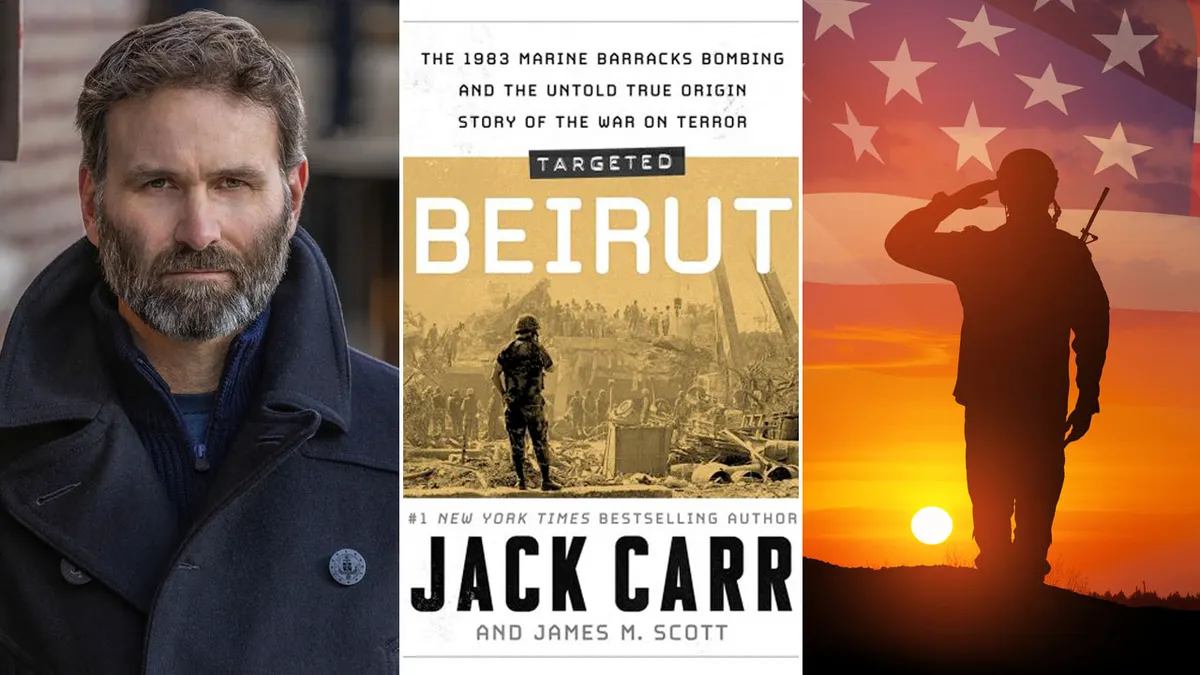
The nonfiction guide is revealed this week. “The destruction was rapid and catastrophic,” Carr and Scott write in regards to the 1983 assault on U.S. Marines. “The constructing’s open inner structure, capped by a roof that functioned just like the cork on a champagne bottle, trapped and magnified the devastating violence. The explosion blew out the underside of the constructing, driving the concrete slab eight ft into the earth.” (Jack Carr/Simon & Schuster; iStock)
Russell seemed again over his shoulder as he ran to see the Mercedes obliterate the guard shack and penetrate the constructing’s atrium, spraying sand throughout the ground of the foyer. The truck got here to a sudden cease, snagged on the atrium’s overhang. Silence adopted. One second turned to 2.
“Son of a b—-,” Russell stated of the terrorist. “He did it.”
The clock within the basement recorded the exact second of detonation: 6:21:26 a.m.
Your entire assault had taken simply ten seconds.
The blast, which investigators later decided exceeded 12,000 tons of TNT, proved greater than six instances as highly effective because the one used towards the American Embassy in April.
“The FBI Forensic Laboratory,” a Pentagon report later famous, “described the bomb as the most important standard blast ever seen by the explosive consultants neighborhood.”
For these on the bottom, the split-second detonation, which might kill and maim lots of, proved unimaginable.
For these on the bottom, the split-second detonation, which might kill and maim lots of, proved unimaginable.
“It was,” as one survivor later recounted, “like each atom within the universe blew aside.”
The destruction was rapid and catastrophic. The constructing’s open inner structure, capped by a roof that functioned just like the cork on a champagne bottle, trapped and magnified the devastating violence. The explosion blew out the underside of the constructing, driving the concrete slab eight ft into the earth.
On the similar time, the blast tore the higher three flooring off the concrete assist columns, every with a fifteen-foot circumference and supported by 13⁄4-inch iron rebar.
“The constructing,” one report concluded, “then imploded upon itself and collapsed towards its weakest level — its sheared undergirding.”

The Beirut barracks terror assault on U.S. Marines in Oct. 1983, stated U.S. Secretary of State Antony Blinken final yr, was the “single deadliest day for the U.S. Marine Corps because the Battle of Iwo Jima.” (Reuters/Evelyn Hockstein/Pool)
Up on the roof, Corporal Martucci, who had heard the preliminary furor far under, began to take a seat up in his sleeping bag simply because the bomb exploded.
“We noticed the middle of the roof truly carry, blow out,” the corporal recalled. “We had wrapped ourselves in our sleeping luggage; I assume it was intuition as a result of noise, however we rode the roof down after that.”
Sergeant Arroyo, cleansing his rifle on the third deck, heard what he thought was gunfire, a typical sound within the Lebanese capital.
“It’s Beirut,” he stated to himself. “That’s like a rooster croaking in Puerto Rico within the morning.”
Subsequent door, Lance Corporal Matthews caught the commotion as he reassembled his M16. “There’s something occurring,” Matthews hollered to a different Marine in his room. “Wake all people up.”
Matthews by no means heard the bomb’s explosion, however he noticed a shiny orange flash because the escaping rush of stress tore the door off its hinges, lifted him out of his chair, and hurtled him by way of the window. Matthews flipped over as soon as within the air after which landed on his ft three tales under, the place he collapsed and rolled to a cease.
“I used to be pinned. I couldn’t transfer. I didn’t know what occurred.”
He climbed again up onto his ft. “I rotated and seemed,” Matthews remembered, “and the constructing was gone.”
Matthews was one of many fortunate ones.
The explosion had thrown him away from the constructing, the place, like an accordion, the fourth flooring had collapsed upon the third, adopted by the second, after which the bottom flooring.
Corporal Farnan was one of many few to witness the constructing’s disintegration. The blast stress had ripped his shirt off, knocked the wind out of him, and tossed him towards a close-by curb.
He struggled to breathe as concrete fragments rained down on him and a cloud of mud rose into the sky.
“I used to be within the eye of a hurricane,” Farnan stated. “I can’t imagine I wasn’t killed.”
A whole bunch of Marines and sailors lay buried beneath the rubble of a constructing that seconds earlier had been their house.
Many had been lifeless, crushed below tons of pancaked concrete and rebar — males who had gone to sleep, by no means to get up.
For extra Life-style articles, go to www.foxnews.com/way of life
Others, nevertheless, had survived, trapped beneath cots, desks, and toppled partitions that for the second shielded them from the onerous weight of the wreckage.
Hospital Corpsman Don Howell, on a cot within the basement, heard what sounded just like the roar of a freight prepare because the constructing got here down on prime of him.
A chunk of concrete struck him in the fitting eye.
“It felt like a boulder,” he stated. “That’s after I rotated and tried to cowl my head.”
CLICK HERE TO SIGN UP FOR OUR LIFESTYLE NEWSLETTER
Lance Corporal Simmons, who had been asleep on the second flooring, struggled to know what occurred.
“I by no means heard the blast, by no means felt myself falling,” he stated. “I couldn’t see something and all I felt was dust.”
Chaplain Wheeler, who had been asleep on the fourth flooring, skilled the identical.
CLICK HERE TO GET THE FOX NEWS APP
“I didn’t hear something,” he remembered. “Subsequent factor I knew, I awakened under the ground and under the particles — buried. That’s after I first realized issues weren’t proper. I used to be pinned. I couldn’t transfer. I didn’t know what occurred.”
The clock now ticked on their survival.
Excerpted from “Focused: Beirut: The 1983 Marine Barracks Bombing and the Untold Origin Story of the Struggle on Terror” by Jack Carr and James M. Scott, revealed by Emily Bestler Books/Atria, an imprint of Simon & Schuster. Copyright © by Rainsford Consulting LLC. All rights reserved. By particular association.

